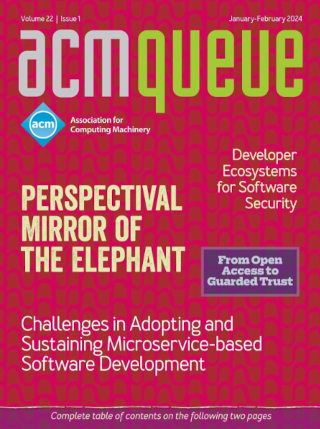Nicole Forsgren, Eirini Kalliamvakou, Abi Noda, Michaela Greiler, Brian Houck, Margaret-Anne Storey - DevEx in Action
DevEx (developer experience) is garnering increased attention at many software organizations as leaders seek to optimize software delivery amid the backdrop of fiscal tightening and transformational technologies such as AI. Intuitively, there is acceptance among technical leaders that good developer experience enables more effective software delivery and developer happiness. Yet, at many organizations, proposed initiatives and investments to improve DevEx struggle to get buy-in as business stakeholders question the value proposition of improvements.
João Varajão, António Trigo, Miguel Almeida - Low-code Development Productivity
This article aims to provide new insights on the subject by presenting the results of laboratory experiments carried out with code-based, low-code, and extreme low-code technologies to study differences in productivity. Low-code technologies have clearly shown higher levels of productivity, providing strong arguments for low-code to dominate the software development mainstream in the short/medium term. The article reports the procedure and protocols, results, limitations, and opportunities for future research.
Ivar Jacobson, Alistair Cockburn - Use Cases are Essential
While the software industry is a fast-paced and exciting world in which new tools, technologies, and techniques are constantly being developed to serve business and society, it is also forgetful. In its haste for fast-forward motion, it is subject to the whims of fashion and can forget or ignore proven solutions to some of the eternal problems that it faces. Use cases, first introduced in 1986 and popularized later, are one of those proven solutions.
Jorge A. Navas, Ashish Gehani - OCCAM-v2: Combining Static and Dynamic Analysis for Effective and Efficient Whole-program Specialization
OCCAM-v2 leverages scalable pointer analysis, value analysis, and dynamic analysis to create an effective and efficient tool for specializing LLVM bitcode. The extent of the code-size reduction achieved depends on the specific deployment configuration. Each application that is to be specialized is accompanied by a manifest that specifies concrete arguments that are known a priori, as well as a count of residual arguments that will be provided at runtime. The best case for partial evaluation occurs when the arguments are completely concretely specified. OCCAM-v2 uses a pointer analysis to devirtualize calls, allowing it to eliminate the entire body of functions that are not reachable by any direct calls.
Comments
(newest first)





